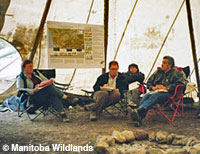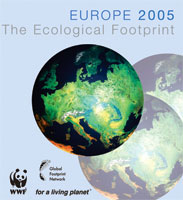
News |
- Water Protection Act Discussion Paper Released
- Mixed Reviews for Great Lakes Agreement
- Supreme Court Says No Treaty Right to Log
- G8 Summit Outcomes - Climate Change
- Government Kyoto Team Suffers Resignations
- Standing Committee Unanimous on Devils Lake
- Poplar River First Nation Interview
- Europe's 2005 Ecological Footprint
- Stop Global Warming Virtual March
- Ontario Pushes Back Coal Retirement
- Board Urges Protection for Arctic Caribou Herds
- Manitoba Métis Rights Court Date Set
| Water Protection Act Discussion Paper Released | 03 August 05 |
 Water Stewardship Minister Steve Ashton has released a discussion paper that outlines a proposed framework for governing nutrient water quality management zones (WQMZ) throughout the province. Water Stewardship Minister Steve Ashton has released a discussion paper that outlines a proposed framework for governing nutrient water quality management zones (WQMZ) throughout the province.The development of regulations to identify and manage WQMZ is an integral part of the Water Protection Act that was passed in the Manitoba legislature on June 16, 2005. As part of the discussion paper released July 20, 2005, Manitoba's landscape has been separated into four zones using scientific criteria that can influence run-off or leaching of nutrients from land to water. These factors include climate, moisture limitations, land slope, topography, soil characteristics, distance to groundwater, erosion potential and crop yield potential. Maps have been prepared showing the proposed zones in each of Manitoba's rural municipalities and are contained in the discussion paper. Buffer set-back distances from water have also been identified where application of nutrients will need to be limited. Manitoba Wildlands Director Gaile Whelan Enns urged Manitoba's communities to respond with public comments. "We see a higher level of transparency and access to information as essential to arrive at nutrient management regulations in Manitoba." The public comment period for the Water Quality Management Zones (WQMZ) Discussion Paper closes on September 30, 2005. View the Government of Manitoba Department of Water Stewardship July 20, 2005 press release View the Manitoba Water Stewardship Discussion Paper - Regulation Under the Manitoba Water Protection Act: Consultation Document for Initial Review: Respecting Water Quality Management Zones for Nutrients (PDF) Visit the Manitoba Department of Water Stewardship web site Source: Government of Manitoba |
|
| Mixed Reviews for Great Lakes Agreement | 03 August 05 |
 On June 30, 2005, the bi-partisan governors and premiers of the U.S. states and Canadian provinces that share the Great Lakes released the second draft of the Great Lakes Annex Implementing Agreements. A sixty-day public comment period also began on June 30. 2005. On June 30, 2005, the bi-partisan governors and premiers of the U.S. states and Canadian provinces that share the Great Lakes released the second draft of the Great Lakes Annex Implementing Agreements. A sixty-day public comment period also began on June 30. 2005.The second draft follows the initial draft, released July 19, 2004 for 90 days of public comment. Public response was overwhelming as thousands of residents in the region called for stronger protection for Great Lakes waters. According to the Government of Ontario, the revised draft agreements are tougher than those released last year and the new draft agreements would provide a virtual ban on diversions of water from the basin with very limited exceptions that would be strictly regulated. However, Ontario made it clear that the 2005 drafts are not final and do not yet represent a consensus. However, According to the Council of Canadians, the second draft of the Great Lakes Annex Implementing Agreements continues to threaten the health of the Great Lakes and significantly weakens Canadian sovereignty over these shared waters. Despite a "no diversions" proclamation, the Agreement allows for exceptions, notably the Chicago Diversion, the largest Great Lakes withdrawal. Illinois' desire to substantially increase its Chicago diversion within the next few years is problematic given uncertainty around the sustainability of current uses of the Great Lakes. The agreements released by the Governors and Premiers of the Great Lakes Basin June 30th are complicated, but according to the Sierra Club of Canada (SCC), the basic issue is simple: the waters of the Great Lakes Basin must be protected - both in quality and quantity - for future generations and all species that depend upon the Great Lakes. To assist the citizens of the Great Lakes Basin, in making their voices heard, the SCC released A Citizen's Primer to Protect the Great Lakes July 11, 2005. The Primer is a joint project of: Great Lakes United, Sierra Club, Sierra Club of Canada, National Wildlife Federation, Lake Ontario Waterkeeper, Union québécoise pour la conservation de la nature (UQCN), Georgian Bay Association, Georgian Baykeeper. The 10 jurisdictions will return to the negotiating table in Fall 2005 to consider the public's input and strive for consensus on final agreements. View the revised Great Lakes Charter Annex agreements by entering EBR Registry Number PB04E6018. View the June 30, 2005 Government of Ontario press release View the June 30, 2005 Council of Canadians press release View the Sierra Club of Canada report A Citizen's Primer to Protect the Great Lakes View Manitoba Wildlands Water pages for more information and links regarding the Great Lakes Annex Agreements View previous Manitoba Wildlands news items on the Great Lakes: Ontario Won't Sign Great Lakes Agreement - November 22, 2004 Great Lakes Annex Meets Opposition - September 29, 2004 Great Lakes Water Diversion Agreement Proposed - August 18, 2004 Sources: Government of Ontario, Council of Canadians, Sierra Club of Canada |
|
| Supreme Court Says No Treaty Right to Log | 26 July 05 |
 Canada's highest court has ruled that historic treaties signed with Aboriginal people in Atlantic Canada don't give them the right to log on Crown lands. Canada's highest court has ruled that historic treaties signed with Aboriginal people in Atlantic Canada don't give them the right to log on Crown lands.In a pair of unanimous decisions handed down July 20, 2005, the Supreme Court of Canada found that treaties signed in 1760-61 only granted the Mi'kmaq the right to continue trade in items traditionally traded at that time. The court said there was no evidence to prove the Mi'kmaq were logging 250 years ago when they signed the treaties with the Crown. The judges also ruled that aboriginals in New Brunswick did not have title to the lands they were trying to log. "Logging is not a logical evolution of the activities traditionally engaged in by Mi'kmaq at the time the treaties were entered into." The first of the two cases before the high court dated back to 1998, when Joshua Bernard of the New Brunswick Eel Ground First Nation was arrested for taking native-harvested logs to a sawmill. He was charged with illegal possession. In the second case, involving Stephen Marshall of the Millbrook First Nation, 13 Mi'kmaq loggers were charged with illegally logging on 13 sites in Nova Scotia. The two men argued they had the right to earn a living by logging on Crown lands because of the treaties signed in 1760-1761. The case attracted widespread interest from across Canada, with more than half a dozen provinces seeking intervenor status because of the possible implications of the court's ruling on the interpretation and application of treaty rights in Canada. If Canada's top court had ruled in favour of native logging rights, the decision could have had a major impact on Atlantic Canada's multibillion-dollar forestry industry. View the July 20, 2005 CBC news story on the Supreme Court decision View the July 20, 2005 Globe & Mail article on the Supreme Court decision Sources: CBC, Globe & Mail |
|
| G8 Summit Outcomes - Climate Change | 26 July 05 |
 At the G8 Summit held July 6-8, 2005, in Gleneagles, Scotland, leaders of the Group of 8 countries issued a joint communiqué and a "plan of action" on Climate Change, Clean Energy, and Sustainable Development. At the G8 Summit held July 6-8, 2005, in Gleneagles, Scotland, leaders of the Group of 8 countries issued a joint communiqué and a "plan of action" on Climate Change, Clean Energy, and Sustainable Development.In the communiqué, the leaders declared that "climate change is a serious and long-term challenge that has the potential to affect every part of the globe and that human activities contribute in large part to increases in greenhouse gases associated with the warming of the Earth's surface." The leaders agreed to launch, and invited other countries to join, a Dialogue on Climate Change, Clean Energy and Sustainable Development to "address the strategic challenge of transforming our energy systems to create a more secure and sustainable future." The leaders also reaffirmed their commitment to the UN Framework Convention on Climate Change and its ultimate objective of stabilizing atmospheric concentrations of greenhouse gases at levels that avoid dangerous human interference with the climate system. They agreed to "move forward... the global discussion on long-term co-operative action to address climate change" at the UN Climate Change Conference later this year in Montreal, Canada. One of the biggest disappointments of the Summit (although not unexpected) was the fact that little in the way of concrete action on climate change was agreed to by the G8 leaders; the goals in the communiqué are vaguely stated, and there is nothing approaching a road map for achieving them. View the Pew Centre on Global Climate Change Summary of the G8 Summit View the G8 Leaders joint communiqué (PDF) View the UNFCC July 8, 2005 press release (PDF) View the July 9, 2005 New York Times Editorial Sources: Pew Centre on Global Climate Change, UNFCC, New York Times |
|
| Government Kyoto Team Suffers Resignations | 26 July 05 |
 A team of Canada's federal officials responsible for a key part of the Kyoto implementation plan has been decimated by resignations. Almost half the members of a team working on a national emissions trading system quit, rather than transfer to Environment Canada from the Department of Natural Resources, following a cabinet decision to regulate greenhouse emissions under the Canadian Environmental Protection Act. A team of Canada's federal officials responsible for a key part of the Kyoto implementation plan has been decimated by resignations. Almost half the members of a team working on a national emissions trading system quit, rather than transfer to Environment Canada from the Department of Natural Resources, following a cabinet decision to regulate greenhouse emissions under the Canadian Environmental Protection Act.The official reason given for the resignations is 'personal reasons' and Environment Canada denied they are a setback to the Kyoto implementation effort. The Environment Canada team is responsible for securing the reduction of emissions from 700 companies in mining and manufacturing, oil and gas, and thermal electricity, which account for almost half of Canada's greenhouse emissions. Manitoba Wildlands director Gaile Whelan Enns indicated that decisions to move this government staff team effort to Environment Canada was welcome. She hoped that moving and renewing the staff team would not slow outcomes during the lead up to COP 11 (Convention of the Parties - Kyoto) in Montreal late November 2005. View the July 21, 2005 Canadian Press article (DOC) Source: Canadian Press |
|
| Standing Committee Unanimous on Devils Lake | 26 July 05 |
 Canada's House of Commons Standing Committee on Environment and Sustainable Development unanimously backed a resolution calling for urgent action on Devils Lake. Canada's House of Commons Standing Committee on Environment and Sustainable Development unanimously backed a resolution calling for urgent action on Devils Lake.The June 14, 2005 resolution calls on the federal government to act decisively to stop the US water diversion project from imperiling Canadian ecosystems. The resolution was brought to the committee by NDP Environment Critic Nathan Cullen. It also calls on the federal government to exhaust "all diplomatic and/or legal options" to stop the Devils Lake diversion until it has been reviewed by the International Joint Commission. According to the latest reports, the Devils Lake diversion - which will allow water to flow from North Dakota's Devils Lake into the Sheyenne River, and then into the Red River, across the border into Canada, and finally to Lake Winnipeg and Hudson's Bay - is set to become operational August 1, 2005. North Dakota initially planned to open the outlet July 1 but talks coordinated by the White House Council on Environmental Quality secured assurances the diversion would remain on hold while discussions continued with Canada and Manitoba. Prime Minister Paul Martin used the opportunity presented by the G8 Summit in Scotland to again press US President George Bush to refer the project to the International Joint Commission (IJC) for review, citing the provisions and intent of the 1909 Boundary Waters Treaty between Canada and the US. View the June 14, 2005 House of Commons Standing Committee on Environment and Sustainable Development press release View Resolution ENV (38-1) of the House of Commons Standing Committee on Environment and Sustainable Development View the July 11, 2005 Winnipeg Free Press article (DOC) View the July 9, 2005 Winnipeg Free Press article (DOC) View previous Manitoba Wildlands news items on Devils Lake: Great Lakes Mayors Back Manitoba - May 31, 2005 Citizen Action on Proposed Devils Lake Outlet - May 12, 2005 Devils Lake Outlet Hangs in the Balance - April 28, 2005 Sources: House of Commons Standing Committee on Environment and Sustainable Development, Winnipeg Free Press |
|
| Poplar River First Nation Interview | 19 July 05 |
 The Natural Resources Defense Council (NRDC) is featuring an interview with leaders of the Poplar River First Nation about the connection between protecting their traditional boreal forestlands and the health and future of their community. The Natural Resources Defense Council (NRDC) is featuring an interview with leaders of the Poplar River First Nation about the connection between protecting their traditional boreal forestlands and the health and future of their community. The interview is based on a conversation with Albert Bittern, Elder; Ernest Bruce, band manager; Victor Bruce, Elder; Ed Hudson, lands councilor; Ray Rabliauskas, land management coordinator; and Sofia Rabliauskas, councilor. Poplar River First Nation's traditional lands, located in eastern Manitoba from Lake Winnipeg to the Ontario border are currently protected from development by a Manitoba regulation. These lands are also a part of the World Heritage Site nomination and are included in NRDC's Heart of the Boreal BioGem campaign. View the NRDC Poplar River Interview Visit NRDC's Heart of the Boreal BioGem web site Visit the Poplar River First Nation web site View recent Manitoba Wildlands news items on Poplar River First Nation and the Heart of the Boreal BioGem: June 1, 2005 April 21, 2005 January 24, 2005 Sources: Poplar River First Nation, Natural Resources Defense Council |
|
| Europe's 2005 Ecological Footprint | 19 July 05 |
 The Global Footprint Network and the World Wildlife Fund (WWF) were joined by the European Parliament for release of the report Europe 2005: The Ecological Footprint in mid June 2005. The Global Footprint Network and the World Wildlife Fund (WWF) were joined by the European Parliament for release of the report Europe 2005: The Ecological Footprint in mid June 2005.The report shows that the European Union uses 20% of what the world's ecosystems provide in terms of fibres, food, energy, and waste absorption, yet is home to only 7% of the world population. Europe's demand on the planet has risen by almost 70% since 1961. Europeans now require 4.9 globally average hectares per person to provide for their lifestyle. As the continent can only supply 2.2 global hectares per person, Europeans rely on the rest of the world to make up this increasing deficit. Europe's Ecological Footprint represents an area more than twice its size. Uncontrolled ecological deficit spending will jeopardize Europe's long-term prosperity. By 2001, humanity as a whole required 2.2 global hectares of productive area per person to sustain current lifestyles, 1.3 times more than in 1961. But the Earth currently has just 1.8 global hectares available per person. This overshoot of some 21 per cent depletes the Earth's natural capital, and is thus possible only for a limited period. View the June 14, 2005 Global Footprint Network press release View the Global Footprint Network / World Wildlife Fund report Europe 2005: The Ecological Footprint Source: Global Footprint Network |
|
| Stop Global Warming Virtual March | 19 July 05 |
 The Stop Global Warming Virtual March on Washington is a non-partisan, grassroots effort to bring Americans together, proving there is a vast national consensus that global warming is a reality today and we must start addressing the dangers it presents now. With the support of leading scientists, political and religious leaders, prominent Americans and concerned citizens, the Virtual March on Washington will move across the United States via the Internet showing evidence of global warming effects, and highlighting people's concerns and real solutions along the way. The Stop Global Warming Virtual March on Washington is a non-partisan, grassroots effort to bring Americans together, proving there is a vast national consensus that global warming is a reality today and we must start addressing the dangers it presents now. With the support of leading scientists, political and religious leaders, prominent Americans and concerned citizens, the Virtual March on Washington will move across the United States via the Internet showing evidence of global warming effects, and highlighting people's concerns and real solutions along the way.Over the next year, the Virtual March will travel across the US, gathering together people from all walks of life while raising awareness about global warming. On Earth Day 2006, the March will arrive in Washington D.Cto urge the president to initiate a real plan of action to address global warming. The two other goals are to: persuade Congress to enact new laws to reduce global warming pollution from U.S. power plants, factories and automobiles; and to urge U.S. businesses to start a new industrial revolution of clean energy products that will reduce our oil dependence and global warming pollution. Robert F. Kennedy and the Natural Resources Defense Council are partnering with StopGlobalWarming.org and urging their supporters to join the March. Canadians are also welcome and encouraged to join the March in solidarity with our US neighbors. Visit the Stop Global Warming Virtual March on Washington website View Robert F. Kennedy Jr.'s message about the campaign Source: StopGlobalWarming.org |
|
| Ontario Pushes Back Coal Retirement | 13 July 05 |
 Ontario is saying "no" to coal, but it has moved back the date by which it plans to close its coal-fired electricity generating stations. By far the largest of its coal plants, Nanticoke, which accounts for over half of Ontario's 7,578 MW of coal generating capacity will now close in 2009 instead of 2007 as the Government of Ontario had previously announced. Ontario is saying "no" to coal, but it has moved back the date by which it plans to close its coal-fired electricity generating stations. By far the largest of its coal plants, Nanticoke, which accounts for over half of Ontario's 7,578 MW of coal generating capacity will now close in 2009 instead of 2007 as the Government of Ontario had previously announced. The first of the province's five coal-fired plants, Lakeview Generating Station, was officially closed in April. The McGuinty government's latest plan says three out of the four remaining coal-fired generating stations will shut down by the end of 2007, with Nanticoke (capacity 3,938 MW) to close in early 2009. View the Ontario Government release View Ontario Power Generation webpage on fossil fuel production Source: Government of Ontario |
|
| Board Urges Protection for Arctic Caribou Herds | 13 July 05 |
 The Beverly and Qamanirjuaq Caribou Management Board (BQCMB) released its position paper which unequivocally states its support for protecting calving grounds, post-calving areas, and other important caribou habitats. The Beverly and Qamanirjuaq Caribou Management Board (BQCMB) released its position paper which unequivocally states its support for protecting calving grounds, post-calving areas, and other important caribou habitats.The report, entitled Protecting Calving Grounds, Post-Calving Areas and Other Important Habitats for Beverly and Qamanirjuaq Caribou makes a compelling arguments for safeguarding important parts of the caribou herds' ranges. It also raises the issue of the need for a full exploration of the potential impacts of the proposed Nunavut-Manitoba road. A Manitoba representative sits on this caribou management board. To date there are no protected areas in the north western regions of Manitoba used by the Qamanirjuaq caribou herd during winter. View the Beverly and Qamanirjuaq Caribou Management Board (BQCMB) September 2004 position paper (PDF) Visit Manitoba Wildlands' Biodiversity and Species pages and view a map of the Beverly and Qamanirjuaq caribou range View June 9, 2005 Manitoba Wildlands news item - Manitoba Road Study Ignores Protected Lands |
|
| Manitoba Métis Rights Court Date Set | 13 July 05 |
 The Manitoba Métis Federation (MMF), the Métis Nation's self-government representative of the Manitoba MétisNation, has obtained an April 3, 2006, trial date from Justice Scurfield to continue a 135-year struggle for recognition and action concerning unmet promises made when the Métis negotiated Manitoba's entry into Confederation. The Manitoba Métis Federation (MMF), the Métis Nation's self-government representative of the Manitoba MétisNation, has obtained an April 3, 2006, trial date from Justice Scurfield to continue a 135-year struggle for recognition and action concerning unmet promises made when the Métis negotiated Manitoba's entry into Confederation.Since 1981, the MMF has been pursuing a court action against Canada and Manitoba. In 1990 the Supreme Court affirmed the MMF's right to seek a declaration that Canada and Manitoba had, by unconstitutional measures, undermined rights conferred by Sections 31 and 32 of the Manitoba Act 1870. Thomas Berger and James Aldridge, two of the country's foremost lawyers, lead the legal team on this MMF v. Attorney General of Canada and Attorney General of Manitoba court action. View the May 26, 2005 Manitoba Métis Federation press release Source: Manitoba Métis Federation |
|


 RSS Feeds:
RSS Feeds: